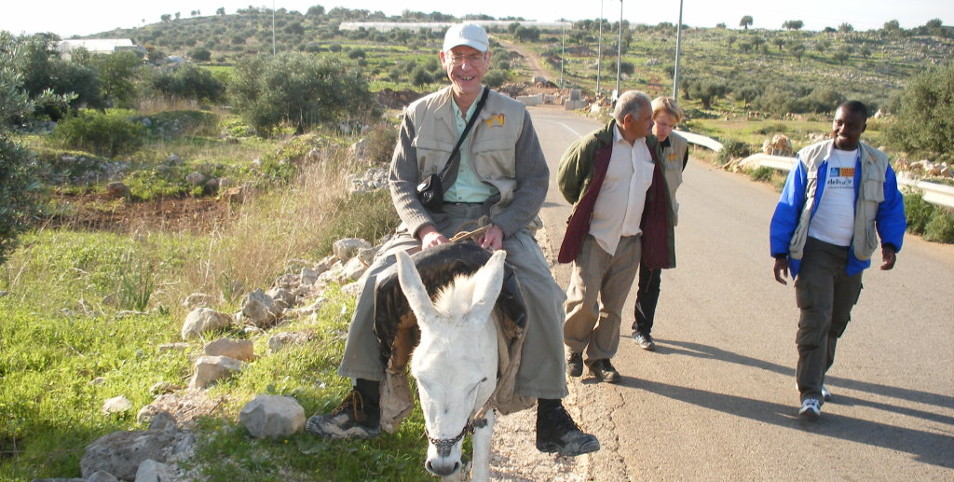Dangerous Olive Trees?
The Palestinian farmer drove his tractor up to the gate, with its trailer full of young olive trees ready for planting. I watched as he entered the building to show his permit to the Israeli soldiers, and as he re-emerged. But then, instead of driving through the gate to get to his field, he turned round, drove back away from the gate, parked his tractor and trailer and walked through the gate on foot. What was going on?
It’s a long and crazy story. The Israeli government are building a Separation Barrier between Israel and the West Bank, which is Palestinian territory occupied by Israel since 1967. The Barrier is an 8m high wall along 15% of its length and a 4m high electrified fence along the rest. The trouble is the Barrier isn’t actually on the border; in many places it’s inside the West Bank. The route of the Barrier encroaches into Palestinian territory, enclosing about 15% of the West Bank. This means that many farmers are cut off from their land. Their homes are on the West Bank side of the Barrier but their farms are on the other side. The Israeli government has kindly provided “agricultural gates”, which are open for about an hour in the morning and an hour in the evening. They also provide permits which authorize farmers to pass through particular gates to get to their land each day. (These permits are not easy to obtain and are sometimes revoked without warning. But that’s another story.)
I was standing near the agricultural gate at Deir Al-Ghusun when I watched the farmer leave his tractor and walk through the gate. I wanted to find out what was happening, so I slowly approached the gate, trying to look as non-threatening as I could. Three heavily armed soldiers walked towards me.
“Is there a problem?” I asked.
“This man has a permit to pass through the gate,” replied one of the soldiers, “but he doesn’t have a permit to take his olive trees through.”
“Does he need a permit to take olive trees through the gate?” I asked.
“Yes, he needs a permit to take olive trees into Israel,” said the soldier. “The reason is that once an olive tree is planted, it is not allowed to be dug up.”
I could hardly believe my ears. What the soldier said is astonishing for two reasons. Firstly the farmer had no intention of taking his olive trees into Israel. He wanted to plant them in his own farm. The soldier seemed not to appreciate that the Barrier is not the border. Secondly, in the last few years, about one million olive trees on Palestinian farms have been wantonly destroyed by Israeli settlers, who are living illegally on Palestinian territory in the West Bank. Yet this 20-year-old lad with a gun was telling me that it is not permitted to dig up olive trees in Israel!
Obviously I was straining at the leash to enter into a discussion on these points with the soldiers. But this is not the role of EAs (Ecumenical Accompaniers). We are there to observe, to document and to report. Furthermore, soldiers are not interested in discussing rights and wrongs. They are “only doing their job”. Trying to continue the conversation would only have inflamed matters.
“OK.” I said. “Thank you very much.”. And I walked away.
Later I wrote up this conversation in the weekly log that all EAs have to keep. This log gets sent to various interested parties such as the Red Cross, the UN and the British Consulate. They use the information to build up data bases and banks of stories about the effects of the Occupation on the lives of Palestinian people. So the story of the Dangerous Olive Trees will live on . . .
I work for Quaker Peace and Social Witness as an Ecumenical Accompanier serving on the World Council of Churches’ Ecumenical Accompaniment Programme in Palestine and Israel (EAPPI). The views contained in this email are personal and do not necessarily reflect those of my employer (QPSW) or the WCC. If you would like to publish the information contained here (including posting it on a website), or distribute it further, please first contact the QPSW Programme Manager for Israel/OPT (teresap@quaker.org.uk).
